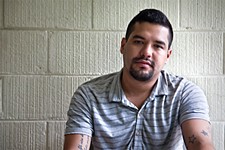Anil's Ghost
Reviewed by Amanda Eyre Ward, Fri., May 5, 2000

Anil's Ghost
by Michael OndaatjeKnopf, 320 pp., $25
If the average novel is a river, flowing cleanly from one bank to another, a Michael Ondaatje novel is a thunderstorm on a hot night, one of those storms that smells of smoke and lights your yard with blinding flashes. You're not always sure what the hell is going on, and the lightning is hitting awful close to your house, but it's so beautiful you can't bear to go inside.
Ondaatje won the Booker Prize for his last novel, The English Patient. Lured by Kristin Scott Thomas' sultry bathtub adventures in the Academy Award-winning film, many eager readers snapped up the book. After a brief attempt to decode Ondaatje's poetic and messy masterpiece, many ended up stashing The English Patient next to Steven Hawking's A Brief History of Time on the Just Not in the Mood Today bookshelf.
Anil's Ghost runs the risk of ending up on the same shelf. I would like to argue, however, for setting aside a Sunday, fixing up a cold gin-and-tonic, and wandering willingly into this lush thunderstorm of a novel.
Anil's Ghost is the most plot-driven of Ondaatje's books (he has published two novels, one memoir, 10 books of poetry, and one book, The Collected Works of Billy the Kid, that nobody knows how to classify). The novel takes place in Sri Lanka, an island republic that evokes visions of tea plantations and Indian Ocean shorelines, but which has been torn apart since 1983 by an ethnic war between Buddhists and Hindus. Enter Anil, a Sri Lankan-born, Western-educated forensic anthropologist who has been asked to help identify the bones of war victims. When Anil discovers that one skeleton in an ancient burial site is, in fact, a recent victim, her search for the horrible truth hidden in her homeland begins.
Ondaatje weaves between past and present, stories that relate to the plot and stories that do not. As in his glorious memoir, Running in the Family, he makes a quilt of a novel, referring to a letter, for example, and then including the letter itself, mentioning a character, and then, without warning, veering into the character's past before making an abrupt U-turn and heading back toward the story at hand. In addition, he breaks an omniscient voice to peek into characters' thoughts at random, making a reader slightly dizzy.
Reading Anil's Ghost is like sitting on a barstool, listening to someone who is the most eloquent storyteller imaginable, and only a little bit drunk. Though Ondaatje's stories may not always follow logically, the words are carefully chosen and brilliant. As the characters' lives unfolded in Anil's Ghost, and I stopped worrying about where the book would lead me, I came to realize, as Ondaatje notes, that "The drama of all time is the coming of all men into one fate." Or maybe it was the gin.










